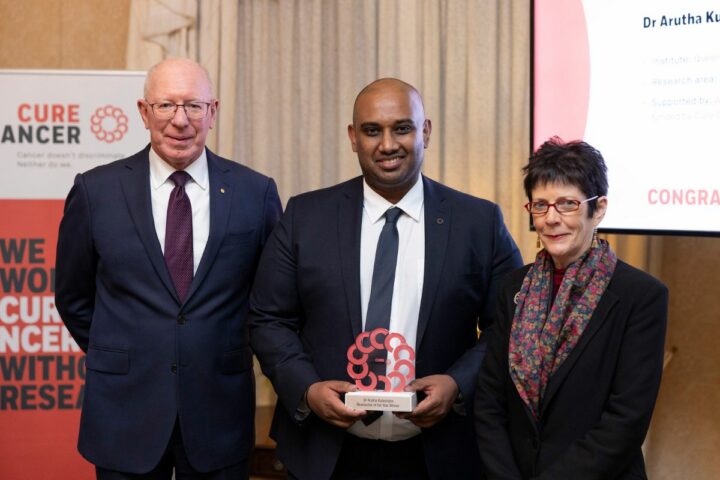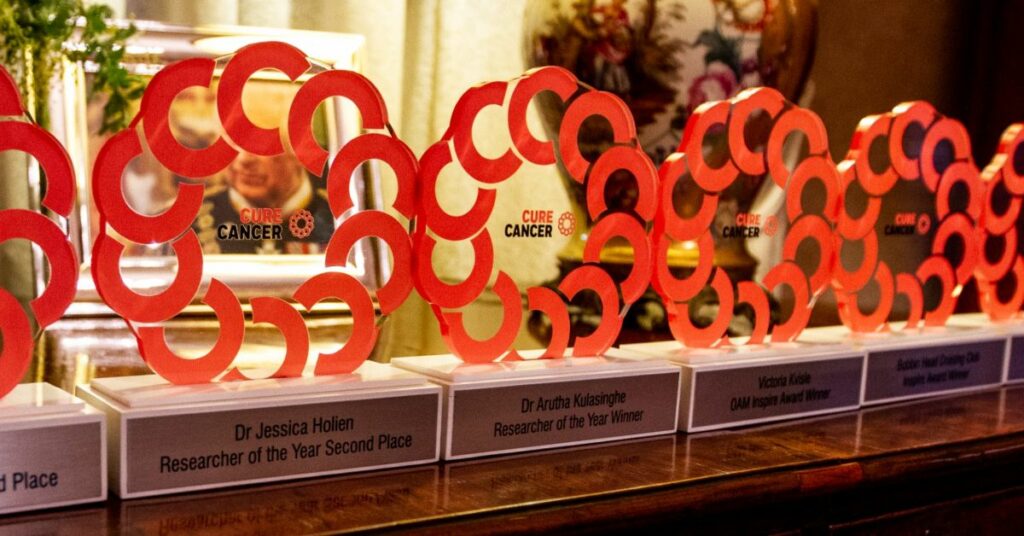For his pioneering work in spatial transcriptomics, the cancer researcher from The University of Queensland‘s Frazer Research Institute was recognised as Cure Cancer’s Researcher of the Year at the Admiralty House.
Cure Cancer, the 56-year old organisation dedicated to funding the most promising emerging researchers in the country, held its annual Researcher of the Year event on June 15th.
Over the years, the Researcher of the Year Awards has recognised over 25 brilliant researchers who have achieved breakthroughs and considerable advancements in the field of cancer research. The awardees were chosen based on excellence and overall impact and have gone on to excel in their fields.
This year, the organisation celebrated the achievements of Cure Cancer alumni Dr Mark Adams, Dr Jessica Holien, and Dr Arutha Kulasinghe in the fields of lung cancer, ovarian cancer, and immunotherapy. Both Dr Mark Adams and Dr Jessica Holien were honoured as finalists, while the prestigious title of Researcher of the Year was awarded to Dr Arutha Kulasinghe.
“Tumour atlasing is a whole new field of biology and computational research, and we are extremely proud of Arutha for these accomplishments,” says Nikki Kinloch, CEO of Cure Cancer.
Immunotherapies have been hailed as a game changer in the treatment of solid tumours. However, there are currently no means to identify whether a patient will respond to therapy.
Dr Arutha Kulasinghe’s project uses novel tissue mapping technology to assess the tumour spatially and genetically over the course of therapy to predict its response to immunotherapy. In doing so, he and his team can make individualised assessments of a patient’s tumour and identify biomarkers targeted for immunotherapy, thus making treatment more effective.

“My lab wouldn’t be where it is today without the funding from Cure Cancer,” says Arutha.
“I’m eternally grateful to Cure Cancer, the donors, and supporters for the opportunity to lead an exciting area of cancer research. My lab applies technologies that allow us to map a patient’s tumours one-cell-at-a-time. We’re able to see how tumour cells communicate with immune cells and hopefully identify therapies that will work in individual patients.”
Dr Arutha recently received two prestigious research awards in recognition of his immunotherapy work and was published in Immunology & Cell Biology in March 2023.
Rare images from his research work were also featured at Cure Cancer’s “Beauty in Breakthroughs” series, which was first unveiled at the charity event for World’s Best BYO last June 22.
“Being able to see resistance and sensitivity to current generations of cancer therapies at the time of diagnosis is groundbreaking, and it can be life-changing for those who are going through cancer treatment,” added Kinloch.
Related: Cure Cancer announces new funding opportunities for emerging scientists
Menchie Khairuddin is a writer Deputy Content Manager at Akolade and content producer for Third Sector News. She is passionate about social affairs specifically in mixed, multicultural heritage and not-for-profit organisations.
- Menchie Khairuddinhttps://thirdsector.com.au/author/menchi-kakolade-co/
- Menchie Khairuddinhttps://thirdsector.com.au/author/menchi-kakolade-co/
- Menchie Khairuddinhttps://thirdsector.com.au/author/menchi-kakolade-co/
- Menchie Khairuddinhttps://thirdsector.com.au/author/menchi-kakolade-co/











